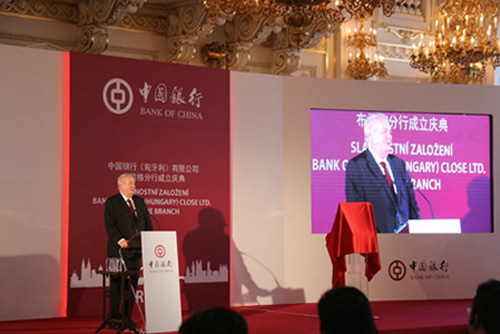President of Czech Republic Milos Zeman attends the opening ceremony for a Bank of
China branch in Prague, Capital of the Czech Republic, on August 31, 2015.
The president of the Czech Republic says his country could be a safe haven for Chinese investors in central and eastern Europe.
Milos Zeman commented head of Chinese President Xi Jinping's upcoming visit.
CRI reporter Guo Yan takes a closer look at the booming business cooperation between the two countries.
Czech President Milos Zeman says bilateral relations are entering their best period ever, with many development opportunities.
"There is a very friendly environment. So Czech Republic might be such a safe haven for China, for China's investment not only in Czech Republic, but also in the EU and other countries in Europe. And let us start with the hub. If there is hub in the Prague airport, it means the inflow of China's tourists, merchants, students, politicians, entrepreneurs and so on. That might be the same help for the Chinese banks, China's investment companies and so on."
China has been the Czech Republic's largest trading partner outside the European Union and the Czech Republic is China's second-largest trading partner in Central and Eastern Europe.
Bilateral trade was 11 billion U.S. dollars last year.
The Czech Republic's export to China has tripled over the past 10 years.China's investment in Czech Republic has reached 300 million U.S. dollars.
The president welcomes Chinese companies to invest in infrastructure construction in central Europe.
"In Europe, there is a very good communication from the west to the east, but there is no good communication from the north to the south. We need the water corridors, the railways, the highways from the south to the north. And I know that China's companies are very experienced in this area, and such a long-term investment might present one of the opportunities in the frame of the '16 plus 1'."
The Bank of China, one of the five largest state-owned commercial banks in China, opened a branch in the Czech Republic last year.
President Zeman says the bank has helped to boost business ties between the two countries.
"This is a very good chance to have the first fully Chinese bank in Czech territory and in territory of the EU, and this might be the banking center of China for all Europe. We have engaged in this project because they offer some participation for Czech building firms. Of course this is an excellent idea, which represents the historical experience, so I think this 'Silk Road' might again connect Europe and China."
Experts say the internationalization of the Renminbi has been facilitating the economic cooperation, trade and account settlement between China and the Czech Republic.
Charles Kucera is CEO of Czechinvest.
"Looking into the details (the internationalization) should be done because of the benefits, so I consider that's very important [to internationalize RMB]. So it's very important for the Bank of China opened a branch here,"
Bank of China Hungary branch chief Chen Huaiyu says it also helps to hedge the exchange-rate risk and to enlarge the sources of investment.
"The internationalization of the Renminbi is an organic component of the Belt and Road Initiative. It facilitates to a certain extent the connectedness of capital, trade and popular mentality, these being among the five principles of the Initiative. Capital-wise, the internationalization of the Renminbi broadens the sources of capital and revenue for investors on both sides; trade-wise, it reduces exchange rate-incurred losses and increases the capability of account settlement for trade-centered enterprises on both sides."
The branch chief notes travelers can benefits from these moves.
"For example, when one travels abroad, he or she experiences considerable losses during currency exchanges. It's not convenient to exchange money and use exchanged currencies. It will be a great convenience that people can use Renminbi in foreign countries. Through internationalization of the Renminbi, it will be readily accepted as an international currency by various peoples."
The Czech Republic is an attractive destination for Chinese tourists, who made a record number of visits to the country in 2015 - more than 300-thousand.
Hainan Airlines opened direct flights between Beijing and Prague last September, the first non-stop service between the two countries.
CRIENGLISH.com
Please
contact us in case of Copyright Infringement of the photo sourced from the internet, we will remove it within 24 hours.

